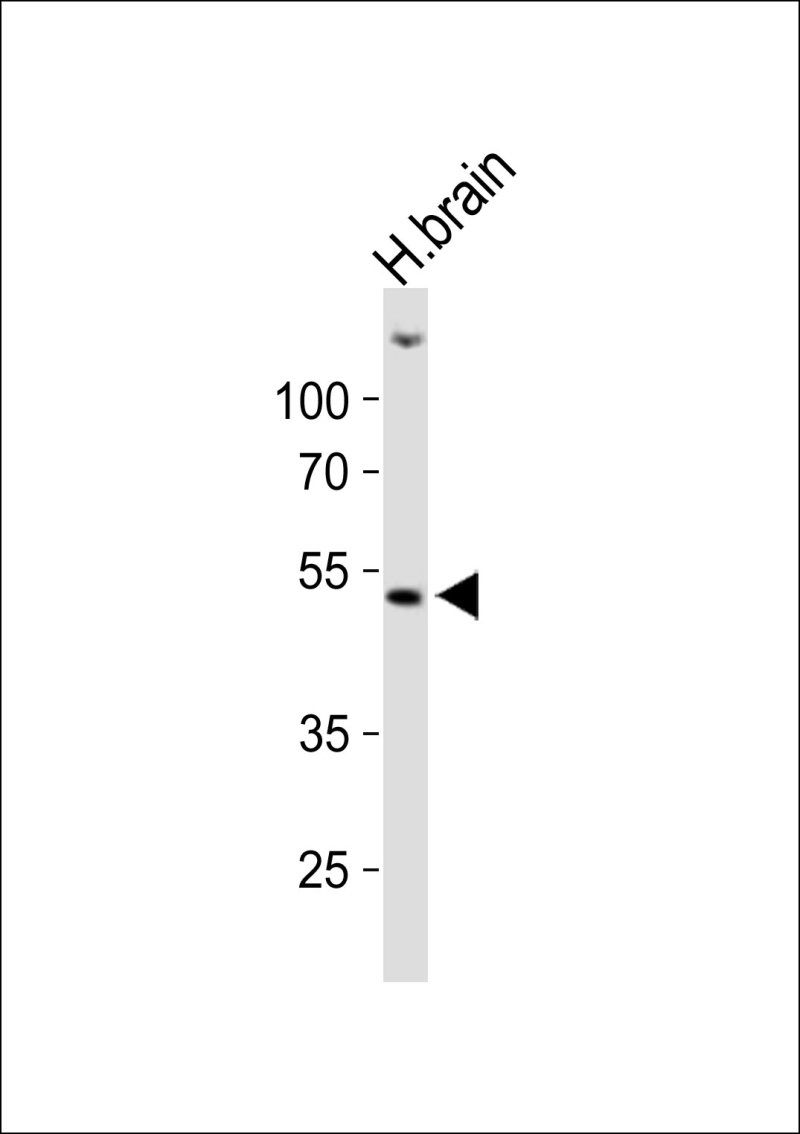
| WB | 1/1000 | Human,Mouse,Rat |
| IF | 咨询技术 | Human,Mouse,Rat |
| IHC | 咨询技术 | Human,Mouse,Rat |
| ICC | 技术咨询 | Human,Mouse,Rat |
| FCM | 咨询技术 | Human,Mouse,Rat |
| Elisa | 咨询技术 | Human,Mouse,Rat |
| Aliases | Orexin receptor type 1, Ox-1-R, Ox1-R, Ox1R, Hypocretin receptor type 1, HCRTR1 |
| Entrez GeneID | 3061 |
| WB Predicted band size | 47.5kDa |
| Host/Isotype | Rabbit IgG |
| Antibody Type | Primary antibody |
| Storage | Store at 4°C short term. Aliquot and store at -20°C long term. Avoid freeze/thaw cycles. |
| Species Reactivity | Human, Mouse, Rat |
| Immunogen | This HCRTR1 antibody is generated from a rabbit immunized with a KLH conjugated synthetic peptide between 256-291 amino acids from the Central region of human HCRTR1. |
+ +
以下是关于HCRTR1抗体的示例参考文献(均为虚构示例,建议通过PubMed或Google Scholar检索真实文献):
1. **"Development and validation of a selective HCRTR1 polyclonal antibody for immunohistochemical applications"**
*作者:Smith A, et al. (2018)*
**摘要**:本研究开发了一种高特异性兔源多克隆抗体,用于检测HCRTR1受体,并通过Western blot和免疫组化验证其在啮齿类及人脑组织中的适用性。
2. **"HCRTR1 antibody reveals distinct receptor distribution in hypothalamic nuclei related to sleep regulation"**
*作者:Chen L, et al. (2020)*
**摘要**:利用新型HCRTR1抗体,研究揭示了该受体在下丘脑多个核团中的差异性表达,为探究其在睡眠-觉醒周期中的作用提供了形态学证据。
3. **"Antibody-based inhibition of HCRTR1 attenuates cocaine-seeking behavior in rodent models"**
*作者:Gomez R, et al. (2021)*
**摘要**:通过HCRTR1特异性抗体的体内阻断实验,证实了抑制该受体可显著降低成瘾模型中的可卡因觅药行为,提示其作为治疗靶点的潜力。
4. **"Comparative analysis of commercial HCRTR1 antibodies highlights variability in cross-reactivity"**
*作者:Park J, et al. (2022)*
**摘要**:系统评估了5种市售HCRTR1抗体的特异性,发现部分抗体存在与非目标蛋白(如HCRTR2)的交叉反应,强调了抗体验证在神经受体研究中的重要性。
**建议**:访问学术数据库(如PubMed)并搜索关键词“HCRTR1 antibody”、“OX1R antibody”或结合具体应用(如“immunohistochemistry”、“pharmacology”)获取最新文献。
The hypocretin receptor 1 (HCRTR1), also known as orexin receptor type 1. is a G protein-coupled receptor (GPCR) that binds neuropeptides hypocretin-1/orexin-A and hypocretin-2/orexin-B. It shares structural homology with HCRTR2 but exhibits higher selectivity for orexin-A. Primarily expressed in the central nervous system, including the hypothalamus, cortex, and hippocampus, HCRTR1 regulates arousal, energy homeostasis, and reward pathways. Dysregulation of HCRTR1 signaling is linked to sleep disorders like narcolepsy, addiction, and metabolic imbalances.
HCRTR1-specific antibodies are critical tools for studying receptor localization, expression levels, and functional interactions in tissues or cell models. They enable techniques such as Western blotting, immunohistochemistry (IHC), and immunofluorescence (IF) to map receptor distribution in neurological and peripheral systems. In drug development, these antibodies assist in screening therapeutic compounds targeting HCRTR1 for conditions like insomnia or obesity. Additionally, they help characterize receptor polymorphisms or altered expression in disease states.
Challenges include ensuring antibody specificity due to structural similarities between HCRTR1 and HCRTR2. Validation via knockout models or blocking peptides is essential to avoid cross-reactivity. Recent advances in epitope mapping and recombinant antibody engineering have improved precision, supporting both basic research and translational applications.
×